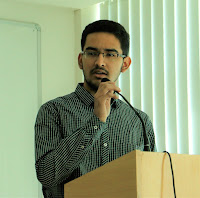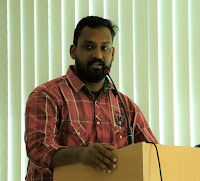The Dept. of Arts (Philosophy),
SHSS, supported by Sophia Club, Manipal University Jaipur had organized a guest
lecture on the topic “Ecological Citizenship and Ethical Burial” which was
attended by students and faculty members of the School of Humanities and Social
Sciences in large numbers. The speaker for the lecture was Dr. William Sweet, Professor of Philosophy and Director of the Centre for
Philosophy,
Theology and Cultural Traditions at St Francis Xavier University, Nova
Scotia, Canada. Dr. Anthony sir, Professor of Philosophy and HOD of Dept. of
Arts, welcomed and introduced the speaker.
Dr. William Sweet was honored by Prof. Manju Singh ma’am, Director, School of
Humanities and Social Sciences and Dr. Anthony sir. |

The lecture
started with Dr. William Sweet sir emphasizing on the importance of ecological
citizenship. The humanity is going through an increasing ecological crisis. In
response, a number of governments have adopted a number of policies. The
lecturer also stressed on the seven basic claims of ecological citizenship.
There is no fundamental difference between origin of humanity and the origin of
life. Basic ecological values and all natural things are inherently related. All
life should exist in ecological balance. Ecological citizenship theory
recognizes limits of resources on earth. Given population size, ongoing
population growth and growing industrialization, there is a need to safeguard the
natural environment. Human beings over the course of their existence have come
to require a number of desires, abilities and powers. There is always desire
for gaining more in life and these desires only end in death. Human beings
should control desires and use technology to return humanity to a level of
existence that establishes and maintains ecological balance.
Human beings
like to celebrate death. The value of a person’s life is measured by how big
and extravagant a funeral is organized for them; the bigger the tomb, the more
important the person. Ethical burial accentuates the proper relationship
between human and nature. There is an increasing need to protect and preserve
the land effected by traditional burial practices so that the environment can
return to its previous state. Green burial is not only important for respect of
nature but also for respect of human beings. Our lives are just appreciated for
its materialistic values. The quality of living has been reduced, and why, just
because of our insatiable need for materialistic and profligate living.
 A
well-ordered ecological environment can only become a reality if there are
adequate resources, diverse species, efficient energy and a balanced ecology.
There has to be harmony between nature and human. Every year around ten million
people die in one part of the world. Just imagine what amount of perfectly good
land is wasted if approximately two sq. meters of land is used to bury a
person. Green burial needs to be put into practice so that we can hope for a
better future as it will provide us with more farmland, clean water and more
resources. Resources we have now are not for us to exploit but to share with
the future generation.
A
well-ordered ecological environment can only become a reality if there are
adequate resources, diverse species, efficient energy and a balanced ecology.
There has to be harmony between nature and human. Every year around ten million
people die in one part of the world. Just imagine what amount of perfectly good
land is wasted if approximately two sq. meters of land is used to bury a
person. Green burial needs to be put into practice so that we can hope for a
better future as it will provide us with more farmland, clean water and more
resources. Resources we have now are not for us to exploit but to share with
the future generation.After the lecture was concluded, an interactive Q&A session followed. Dr. William sir was then offered a memento from Sophia Club. The vote of thanks was given by Dr. Robin Luke sir, Assistant Prof. of Philosophy, Dept. of Arts.







